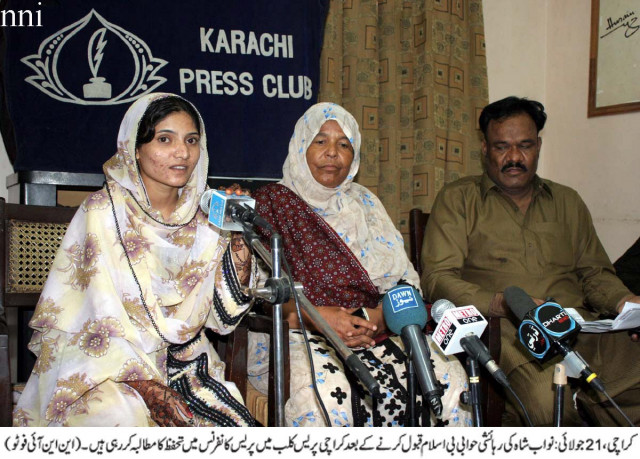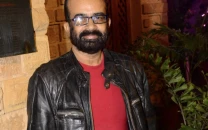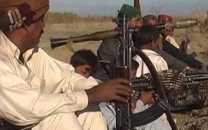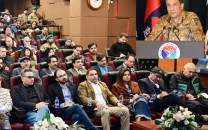Protect me from my parents, says girl who ‘freely’ converted to marry Muslim man
The girl’s in-laws claim that she married Amir Baloch under no compulsion.

Protect me from my parents, says girl who ‘freely’ converted to marry Muslim man
A seemingly underage girl, Hawa Bibi, who claimed that she converted to Islam to marry her current husband, has asked the government to protect her and her in-laws from her parents, who had registered a case against them.
Wearing a pretty Baloch dress, Hawa said during a press conference at the Karachi Press Club that she was a Dalit before she converted to Islam on July 9. She said that her previous name was Heerki, and she said that she was the youngest among her nine siblings. The girl’s highly polished computerised national identity card, however, mentioned her date of birth as January 1, 1985. She presented her father’s name as Babu Bheel.
The newlywed couple hail from Essar Pura, Shaheed Benazirabad district. Hawa’s family reportedly lived near Baloch’s family, and used to visit them quite often. “She was highly enthusiastic about Islamic customs, and insisted that I help her convert to Islam,” said Hameeda Baloch, Amir’s mother. “I advised her to ask parents first. We have not forced her to change her religion. There was also no love affair involved.”
“Bibi wanted to convert to Islam, and Hameeda gave her shelter. Hawa is not underage,” said Rao Faheem, a social worker who accompanied Hawa and her in-laws at the press conference.
“My mother asked me to marry her, and I could not deny her orders. Hawa is nearly eight years older than me, but I accepted her as my wife because she changed her religion,” said Amir, who is a rickshaw driver.
Faheem claimed that a fake case was registered against the Baloch family, and that the police were “creating problems” for the couple.
Bibi just replied that Islam is a good religion. “It is my own wish and no one had forced me to change my religion. I am happy with my new life,” she added.
Zeenat Naz, Amir’s aunt and the Pakistan Peoples Party’s ladies wing president for Keamari, said that all possible protection should be provided to the couple. “I will ask party leaders to help them.”
Forced conversions
The issue has prompted much debate in Pakistan. Similar incidents involving Rinkle Kumari and Dr Lata Kumari caused outrage in some segments of society a couple of months back.
Human Rights Commission of Pakistan’s Amarnath Motumal had claimed that “[Nearly] 20 to 22 girls are converted every month [in Sindh],” but their families do not go public as they fear the incident will ruin their reputation. Rinkle’s family, who hailed from Mirpur Mathelo, managed to organise a sizeable public response to the situation, and her case went all the way to the Supreme Court.
The National Assembly’s standing committee on national harmony decided on July 16 to forward its recommendations to forced conversion laws already on the books to the law ministry. Some of the key recommendations included prescribing life sentences, as well as financial penalties, for those found involved in the practice. The victims should also have access to a place where they could think about the issue without any pressure from outside groups. Commissions should be established in provinces where such complaints could be brought up.
A resolution against forced conversion was also moved by minority MPAs in the Sindh Assembly and it is still in the doldrums. Saleem Khursheed Khokhar and Pitamber Sewani argued in the resolution that a ban should be imposed on forceful conversions and proposed strict punishment against those people found involved in the practice.
However, in a legal setback, a three-member Supreme Court bench comprising Chief Justice Iftikhar Muhammad Chaudhry, Justice Jawad S Khawaja and Justice Khilji Arif Hussain dismissed a petition filed by the Pakistan Hindu Council in May 2012. The council had asked the court to direct relevant authorities to promulgate a law making forceful conversions a cognisable offence. The bench, in its ruling, cited Article 20 of the constitution, which protects religious freedoms of citizens.
With additional input by news desk
Published in The Express Tribune, July 22nd, 2012.



















COMMENTS
Comments are moderated and generally will be posted if they are on-topic and not abusive.
For more information, please see our Comments FAQ